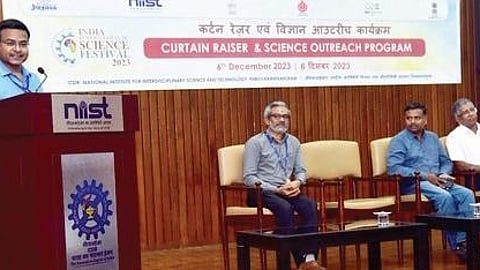

THIRUVANANTHAPURAM: CSIR-National Institute for Interdisciplinary Science and Technology (CSIR-NIIST) has entered into a collaborative memorandum of understanding (MoU) with Vikram Sarabhai Space Centre (VSSC) to scale up research and delivery of strategically advanced materials for India’s space programme.
NIIST director C Anandharamakrishnan and VSSC director S Unnikrishnan Nair exchanged the umbrella MoU in this regard recently. The agreement facilitates VSSC and CSIR-NIIST to identify the broad areas of collaboration, leading to the delivery of advanced materials like engineered alloys, coatings and functional materials, which have critical applications in space programmes.
CSIR-NIIST, a premier interdisciplinary research laboratory under the Council of Scientific and Industrial Research (CSIR), Government of India, has a long record of pioneering work in research and development (R&D) in the area, which would benefit VSSC, the lead centre of the Indian Space Research Organisation (ISRO), based in Thiruvananthapuram.
ISRO believes that manufacturing very high-end materials, electronics, and composites is necessary for India to become completely self-reliant in space research and technology. “We have been concentrating on doing it within India all the time. For example, the materials we use for our rockets and satellites are a reasonably high percentage indigenous,” said ISRO chairman S Somanath.
On completion of Chandrayaan and Aditya-L1 mission programmes, ISRO hopes to develop strategically important advanced materials and indigenous technologies for a self-reliant India in its forthcoming space projects.
Dr Anandharamakrishnan said the MoU assured strategic materials for ISRO programmes, which are a high priority to NIIST and would deliver engineered components meeting ISRO specifications.
The collaboration between the two premier institutions is expected to give greater impetus to India’s highly successful space mission, aiming for many more this year after last year’s historic achievements.
Association aims impetus to country’s space mission
The collaboration between the two premier institutions is expected to give greater impetus to India’s highly successful space mission, aiming for many more this year after last year’s historic achievements.